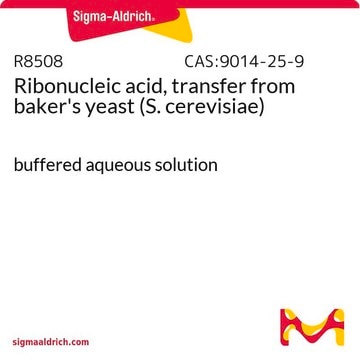10109223001
Roche
RNA from yeast
dry powder, pkg of 100 g
Sinónimos:
RNA from yeast, RNA
Iniciar sesiónpara Ver la Fijación de precios por contrato y de la organización
About This Item
UNSPSC Code:
41106311
Productos recomendados
biological source
yeast
Quality Level
form
dry powder
packaging
pkg of 100 g
manufacturer/tradename
Roche
color
yellowish to brown
solubility
water: soluble
storage temp.
room temp
Categorías relacionadas
General description
RNA from yeast is the total RNA obtained from Candida utilis.
Application
RNA from yeast has been used:
- as a carrier RNA for in situ hybridization
- for RNA coimmunoprecipitation
RNA from yeast has been used:
- to investigate its effect on the formation of transactivation response element (TAR) DNA-binding protein 43 (TDP-43) low-complexity domain (LCD) droplets in phosphate buffer to determine the possible influence of RNA binding on the liquid–liquid phase separation (LLPS) and/or aggregation of TDP-43 LCD
- for biomass fractionation to help with separations to assess the fate of methylphosphonate (MPn) or bicarbonate radiotracers in cells
- in hybridization solution for in situ hybridization
Preparation Note
Working solution: This mixture of total yeast RNA is resuspended with sterile, DEPC-treated double-distilled water or TE buffer to 10 mg/ml if used as carrier.
Analysis Note
Absorbance: RNA: 95%, Pi (phosphate): 0.3%
Other Notes
For life science research only. Not for use in diagnostic procedures.
Storage Class
11 - Combustible Solids
wgk_germany
WGK 1
flash_point_f
Not applicable
flash_point_c
Not applicable
Certificados de análisis (COA)
Busque Certificados de análisis (COA) introduciendo el número de lote del producto. Los números de lote se encuentran en la etiqueta del producto después de las palabras «Lot» o «Batch»
¿Ya tiene este producto?
Encuentre la documentación para los productos que ha comprado recientemente en la Biblioteca de documentos.
Los clientes también vieron
Britta Jedamzik et al.
Cold Spring Harbor protocols, 2009(10), pdb-pdb (2010-02-12)
RNA coimmunoprecipitation (co-IP) experiments are an extension of protein co-IP experiments in which in vivo RNA-protein complexes are investigated. This protocol describes how to perform RNA co-IPs from C. elegans whole-worm extracts. In principle, a protein-specific antibody is used to
Donya Pakravan et al.
Biomolecules, 11(4) (2021-05-01)
Aggregates of TAR DNA-binding protein (TDP-43) are a hallmark of several neurodegenerative disorders, including amyotrophic lateral sclerosis (ALS). Although TDP-43 aggregates are an undisputed pathological species at the end stage of these diseases, the molecular changes underlying the initiation of
Simona Abbatemarco et al.
Journal of cell science, 134(22) (2021-10-19)
When exposed to stressful conditions, eukaryotic cells respond by inducing the formation of cytoplasmic ribonucleoprotein complexes called stress granules. Here, we use C. elegans to study two proteins that are important for stress granule assembly in human cells - PQN-59
Anja Werner et al.
iScience, 24(9), 103076-103076 (2021-09-30)
Systemic lupus erythematosus (SLE) is characterized by a loss of self-tolerance, systemic inflammation, and multi-organ damage. While a variety of therapeutic interventions are available, it has become clear that an early diagnosis and treatment may be key to achieve long
Karen Crawford et al.
Current biology : CB, 30(17), 3484-3490 (2020-08-01)
Seminal studies using squid as a model led to breakthroughs in neurobiology. The squid giant axon and synapse, for example, laid the foundation for our current understanding of the action potential [1], ionic gradients across cells [2], voltage-dependent ion channels
Nuestro equipo de científicos tiene experiencia en todas las áreas de investigación: Ciencias de la vida, Ciencia de los materiales, Síntesis química, Cromatografía, Analítica y muchas otras.
Póngase en contacto con el Servicio técnico







